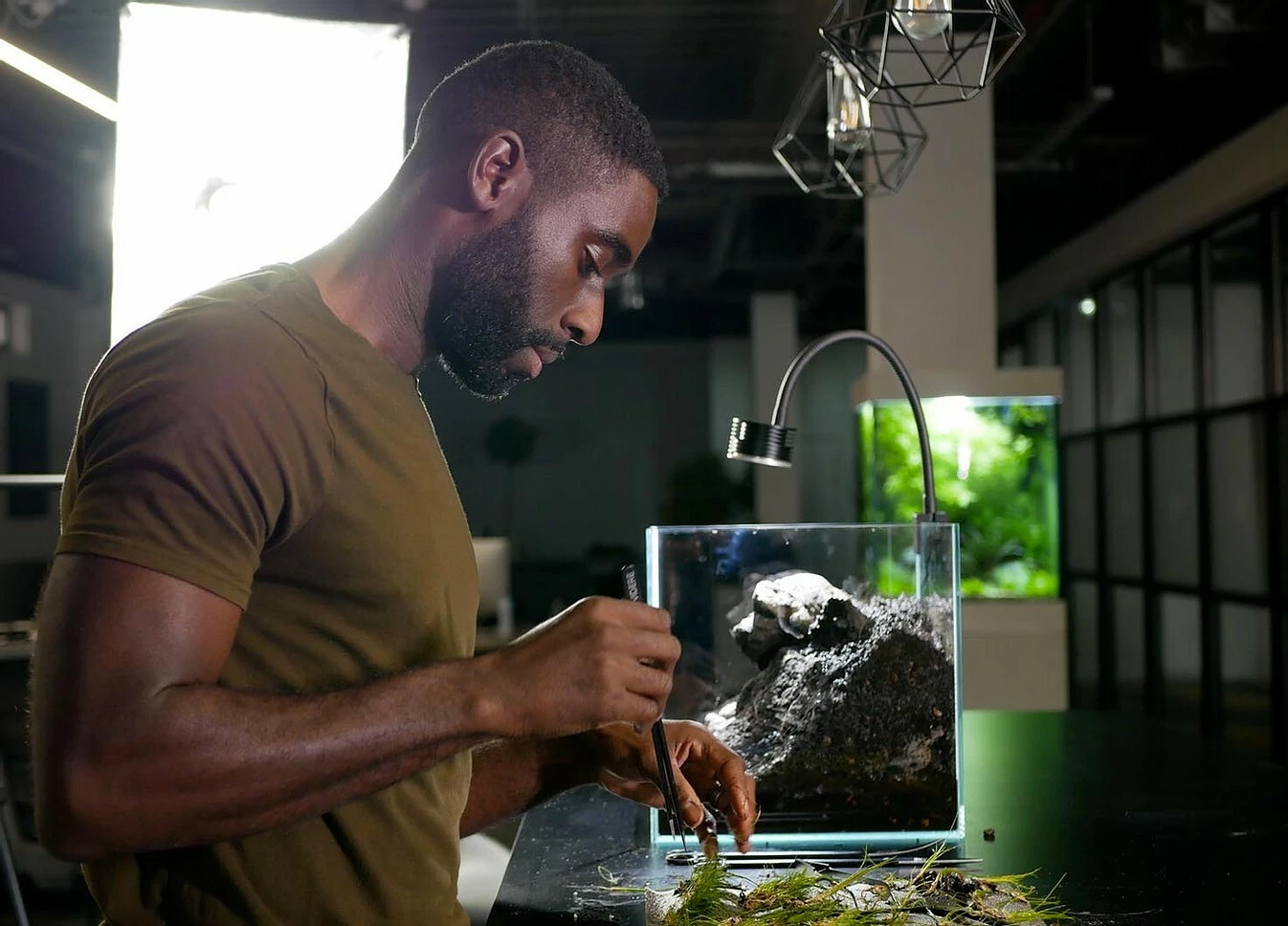
Partner Article
The future of biophilia: how the natural environment can enhance modern workspaces
Positive spaces are just that – they have a positive impact on the people that occupy them. As more and more businesses rethink the future of the office, one thing is certain – ensuring the wellbeing of staff is crucial. Akil Gordon Beckford, creative entrepreneur, aquarium designer and founder of ViDERE, is an advocate for using nature in the workplace to improve our mental and emotional wellbeing and believes that it will be key to businesses in the future.
There’s no doubt that 2020 has forced every business to rethink how it operates, how it looks after its employees and how it will cope with the massive culture change brought about by Covid-19. Those companies that can use the latest technology have allowed more and more staff to work from home, carrying out their roles with as little disruption as possible; while others have had no choice but to introduce strict measures, from mask-wearing to social distancing, to ensure staff work in safe environments.
This new way of working has had a major impact on our mental health, with many business leaders acknowledging it has affected the ability of their workers to function as they were before. Discussing how businesses can use biophilia to help with these changes, Akil Gordon Beckford, comments:
“While none of us know for sure what the new normal will look like as we come out of the pandemic, one thing is certain – ensuring the wellbeing of staff is crucial. Last year, depression and anxiety led to a loss of more than 12.8 million working days. Now with the unprecedented impact of Coronavirus and lockdown, the psychological pressures have only exacerbated this with 60% of adults reporting that their mental health has worsened over the past six months.
I hope that as the opportunity to re-imagine the places where we do business arises we will see a shift in how commercial spaces are used and designed – seeing teams as a community rather than just a workforce and moving away from a utilitarian environment to more communal places with a greater emphasis on creativity. It is key that we start to understand how our physical environment impacts on mental health; after all positive spaces lead to positive outcomes.
One-way companies can do this is by introducing biophilic design. Biophilia is our innate affinity to life or living systems, a term first used by Erich Fromm to describe the psychological orientation of being attracted to all that is alive and vital. While it is certainly not a new design technique, having been used ever since we started creating our own dwellings, we are starting to see a real emergence of natural elements – from houses filled with plants to state-of-the-art fish tanks – to promote wellbeing and create positive spaces.“
Last year Akil and his team at ViDERE carried out a study that looked specifically at the impact on heart rate and blood pressure after observing a fish-tank for ten minutes. The results across the board showed the positive impact the biophilia had on employees. Akil continues:
“Because modern culture drives us all to optimise our life and time to enable us to do more within a day, I wanted to explore how nature in office spaces could help slow us down and appreciate the present. I discovered that participants who looked into a planted aquarium for ten minutes experienced an average drop in blood pressure by 15.6 % and an average drop in heart rate by 3%.
These results could be a game-changer when thinking about workplace design – both in large corporations and in our homes offices – as research has consistently indicated that implementing features such as aquariums and other water installations help boost happiness, making workplaces more flexible and functional and directly impacting positivity, productivity and profitability.“
So, while the future of the office and working from home continues to be unclear, there are several ways that people can incorporate elements of biophilic design to optimise workspaces for physical and mental wellbeing. Taking a proactive approach by using what nature has already gifted, such as working in a well-lit area, with plenty of surrounding space and a view of nature or even house plants, can help people to feel more relaxed and this, in turn, improves our focus and concentration. All of which can only have a positive outcome when it comes to our future.
This was posted in Bdaily's Members' News section by Holly Young .








 The value of using data like a Premier League club
The value of using data like a Premier League club
 Raising the bar to boost North East growth
Raising the bar to boost North East growth
 Navigating the messy middle of business growth
Navigating the messy middle of business growth
 We must make it easier to hire young people
We must make it easier to hire young people
 Why community-based care is key to NHS' future
Why community-based care is key to NHS' future
 Culture, confidence and creativity in the North East
Culture, confidence and creativity in the North East
 Putting in the groundwork to boost skills
Putting in the groundwork to boost skills
 £100,000 milestone drives forward STEM work
£100,000 milestone drives forward STEM work
 Restoring confidence for the economic road ahead
Restoring confidence for the economic road ahead
 Ready to scale? Buy-and-build offers opportunity
Ready to scale? Buy-and-build offers opportunity
 When will our regional economy grow?
When will our regional economy grow?
 Creating a thriving North East construction sector
Creating a thriving North East construction sector